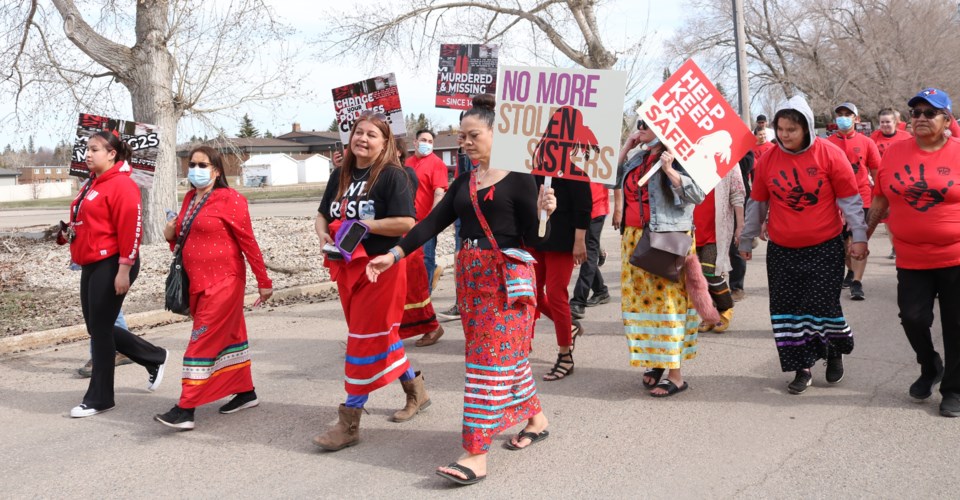YORKTON - A number of people gathered Thursday afternoon in Yorkton to mark Red Dress Day to increase awareness of Missing and Murdered Indigenous Women and Girls in Canada.
“We want to create an awareness about the issue. We want to educate people,” Iris Acoose, Resolution Health Support Worker, with the Yorkton Tribal Council told Yorkton This Week.
The idea of awareness was echoed in a recent provincial government release.
"Today is a day to not only commemorate Missing and Murdered Indigenous Women and Girls, but to also raise awareness and provide education on the importance of addressing gender-based violence," Minister Responsible for the Status of Women Office Laura Ross said in the release. "The Status of Women Office will continue to work toward addressing gender-based violence to ensure the safety of everyone in our communities."
Tribal Chief Isabel O’Soup said it was important to remember the missing.
“We want to continue to serve the memory of the women who haven’t come home,” she said. “It’s the whole reason we walk.”
In fact, O’Soup noted “one day of the year is not enough,” suggesting the missing need be “remembered every day.”
Acoose said it is hoped, with greater education about an awareness of MMIWG it is then hoped “we can make some changes.”
While the obvious issue is the more than 2000 missing women, there is a more root issue of “systemic racism and discrimination and the abuse of our women,” said Acoose.
Acoose said for First Nations women the situation is one they were not used too as traditionally women in their culture held an important place in their society that went beyond bearing children and looking after the home.
“Traditionally they were held in high esteem. They were leaders involved in every aspect of their communities.
But, the changes needed are not something they can do on their own.
“It’s not something we as women can do on our own. We need help,” said Acoose, adding it starts with respect for First Nations women, and then a return to a more traditional way of doing things.
“We’d like to see our women take their rightful place as our healers, as our leaders … It’s important we do this in a traditional way.”
Red Dress Day is commemorated annually on May 5.
The event grew out of the REDress Project, which was created by Métis artist Jaime Black in 2010.
Since its beginnings as part of the REDress Project, Red Dress Day has grown into a national movement. In honour of Red Dress Day, government is encouraging staff and the public to wear red, and to take the time to learn more about the event and the issue of missing Indigenous women and girls.
"Red Dress Day is an opportunity to remember those who are missing and who have been lost, and to reflect on what we can do to address this important issue," Justice Minister and Attorney General Gordon Wyant said in a recent government release. "As a government, we have taken numerous steps to improve responses to missing persons, reduce human trafficking and provide supports to at-risk individuals."
Declaration at Legislature
Provincially, the Federation of Sovereign Indigenous Nations (FSIN) were at the Legislature to launch the Declaration to Honour First Nations Women and Girls. Together they called on the province to acknowledge the disproportionate levels of violence Indigenous peoples face and to stand in solidarity with them by immediately adopting the declaration.
“We are calling on all levels of Government and our First Nations Institutions to adopt and uphold the declaration to ensure we are reclaiming power and place,” said FSIN Vice-Chief Aly Bear in a release “We need to have these standards upheld so we are given the respect and dignity owed to put an end to the ongoing violence inflicted daily.”
O’Soup was at the Legislature for the declaration, and then back in Yorkton for the walk.
In brief comments O’Soup began with a thank you.
“I’d like to thank everybody here that’s not First Nations,” she said, adding missing women “is not just a First Nations issue. It effects all of the people . . . It’s everybody’s issue.”
O’Soup then turned her attention to the declaration in Regina.
“It was an historic day for First Nations,” she said, adding in the gallery they applauded the declaration until told they were to only observe. But, the reaction of applause was a natural one. “We were happy about it . . . It was a great day for us.”
It was particularly gratifying the declaration “was adopted unanimously with no opposition to it,” said O’Soup.
The document acknowledges Indigenous people face disproportionate levels of violence and highlights the urgent need for government to do more in protecting them, including by adopting the 231 recommendations of the National Inquiry on Missing and Murdered Indigenous Women and Girls.
The Declaration also utilizes the principles identified in the Declaration on the Rights of Indigenous Peoples which is an international instrument adopted by the United Nations to enshrine the rights that “constitute the minimum standards for the survival, dignity and well-being of the Indigenous peoples of the world.”





